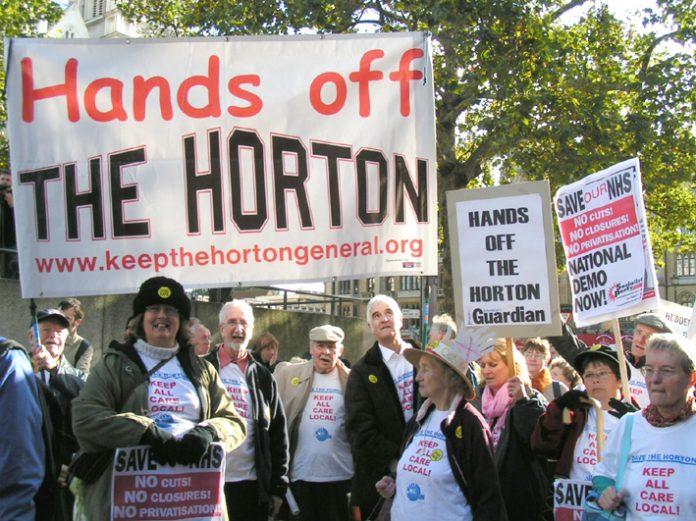NHS DEFENCE campaigners were outraged yesterday at the comments by the Blairite Institute for Public Policy Research that their campaigns to defend District General Hospitals could lead to more than 1,000 unnecessary deaths each year.
Chris Goninan, Vice-Chairman of the Mayor’s Parlour Campaign Team, formed to save West Cornwall Hospital in Penzance, told News Line: ‘I call that an insult. I’m very aware of Blair planning to take services further away from vulnerable people.
‘There is no question in my mind that the whole thing is money driven and to cut and centralise many miles away from where people live.
‘Who’s to say that in ten years time our main hospital won’t be Derriford, ninety miles away.
‘The campaign in Cornwall has been very successful. 30,000 marched in August to save St Michael’s hospital Hayle and the West Cornwall at Penzance. It was an extremely successful march.
‘Cornwall is the most deprived county in England. We have one general hospital in the middle of the county serving 80 per cent of the population. For some it is a journey of over 35 miles in an ageing population.
‘Services should be all about meeting the needs of the people and not budget considerations.’
Neal Stote, Chairman of the Save the Alex Action Group in Redditch, Worcestershire, said: ‘How dare they say that if local groups such as ours are successful in keeping open local A&Es we could be responsible for thousands of deaths!
‘If you take A&E for what it is, the quicker you get there the more likely you are to survive.
‘From our point of view in Worcestershire if the Alexandra A&E in Redditch were to close that would then mean at least a 40 minute trip for local people to the nearest A&E.
‘We’ve had three marches with hundreds of people attending. It was in October last year the Trust said we need to lose A&E, maternity and paediatrics as well as some cancer and gynaecology services.
‘I heard the report this morning from these two professors. How can they say it’s safer to travel 40 minutes instead of five minutes. I would ask them to prove their point.’
Keith Flint from the Stop Harringey Health Cuts Coalition said: ‘They closed most of the local hospitals in Harringey some time ago. It’s fine having a state of the art facility, but if you are dead before you get there it’s not much good.’
George Parish from the Keep the Horton General Campaign, in Oxfordshire, told News Line: ‘That won’t change our campaign and we will keep campaigning to keep the Horton open.
‘We believe it is the other way round and closure could lead to many deaths.
‘Our biggest worry is that once you take any of these services away you get the domino effect and the A&E would be vulnerable.
‘I’ve got no faith in these think tanks. They told us during the consultation that their proposals aren’t money-led, but nobody is going to convince the people who use the services.
‘What they said is wrong. It is the other way round. There will be deaths if these closures go ahead.’
Lilian Elliott, a Merseyside UNISON shop steward in the blood service, said: ‘From a blood service point of view, there are going to be only three processing and testing sites in the country. Currently we have nine.
‘Some of the nine will be totally disestablished and considering the state of the road system in the country it is an absolute nightmare.
‘I’ll give you an example. We have a processing and testing site in Newcastle. Once processing and testing is moved from there to Manchester you will see a situation where blood is collected in Berwick upon Tweed, to be ferried all the way to Manchester somehow. It is madness.
‘At least we have a situation now where if donors give their blood in Birmingham, Newcastle or Cumbria it is processed there.
‘You are going to have a situation where blood will spend most of its time on the motorways.
‘Plus the loss of up to a thousand jobs of scientific and technical staff.
‘How can you say you are going to have excellence in the blood service when you are wiping out two thirds of it. It’s just a nonsense.’
